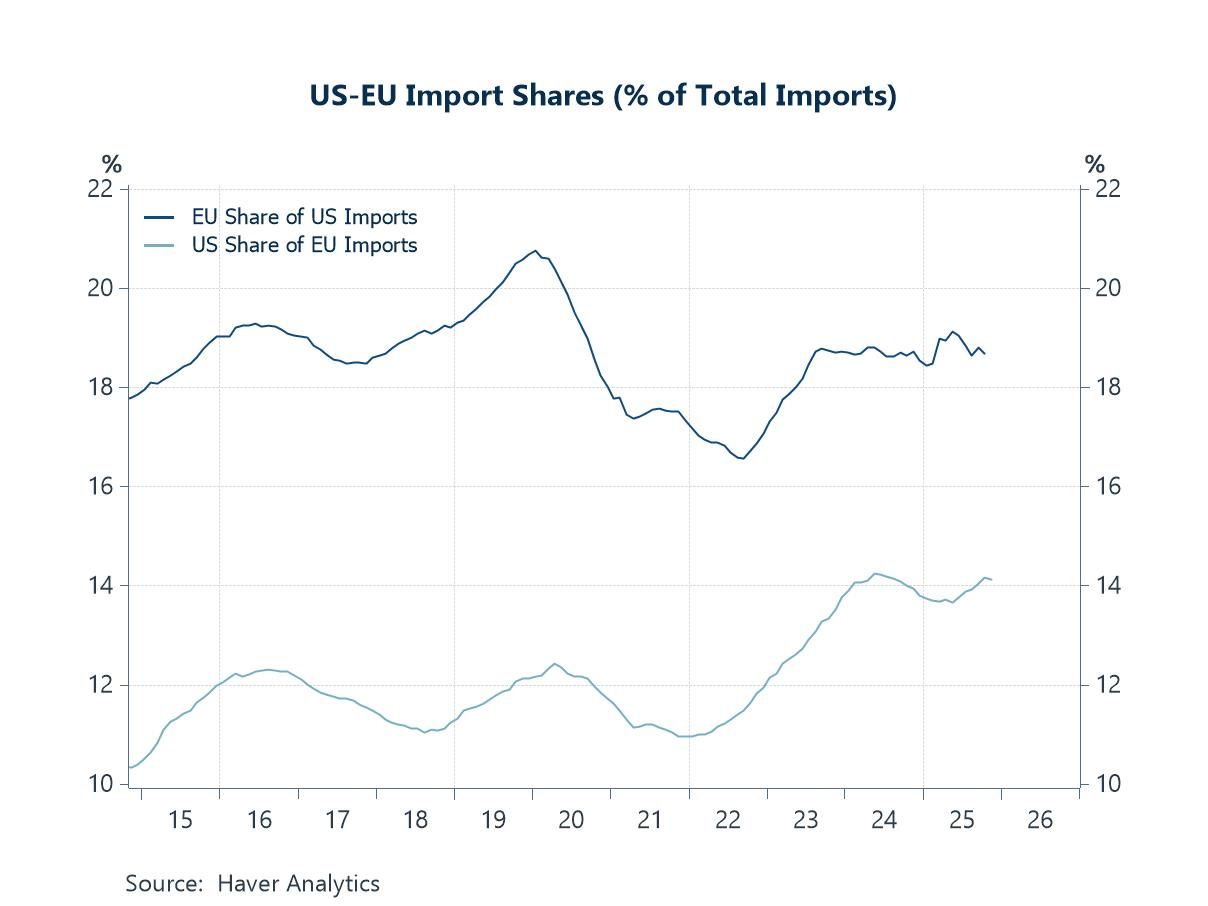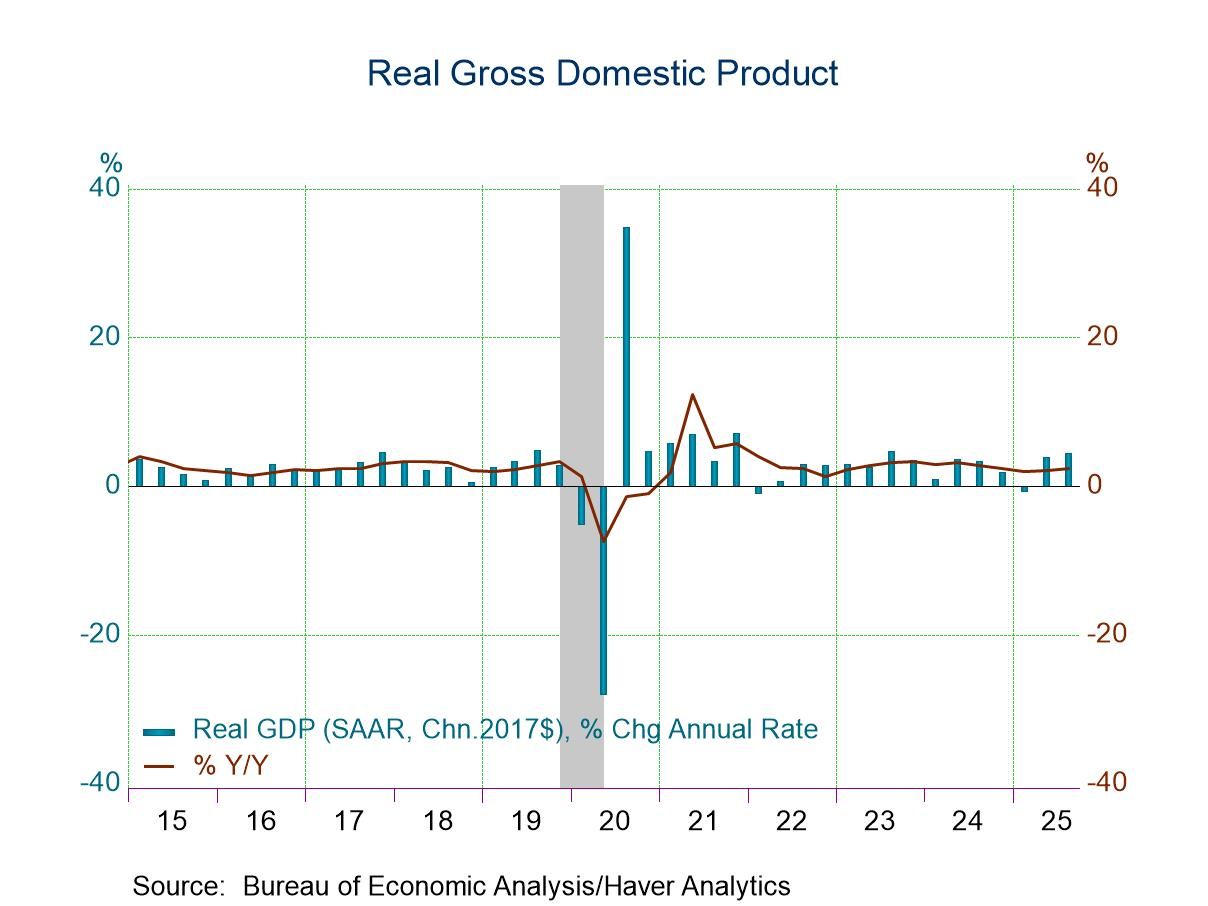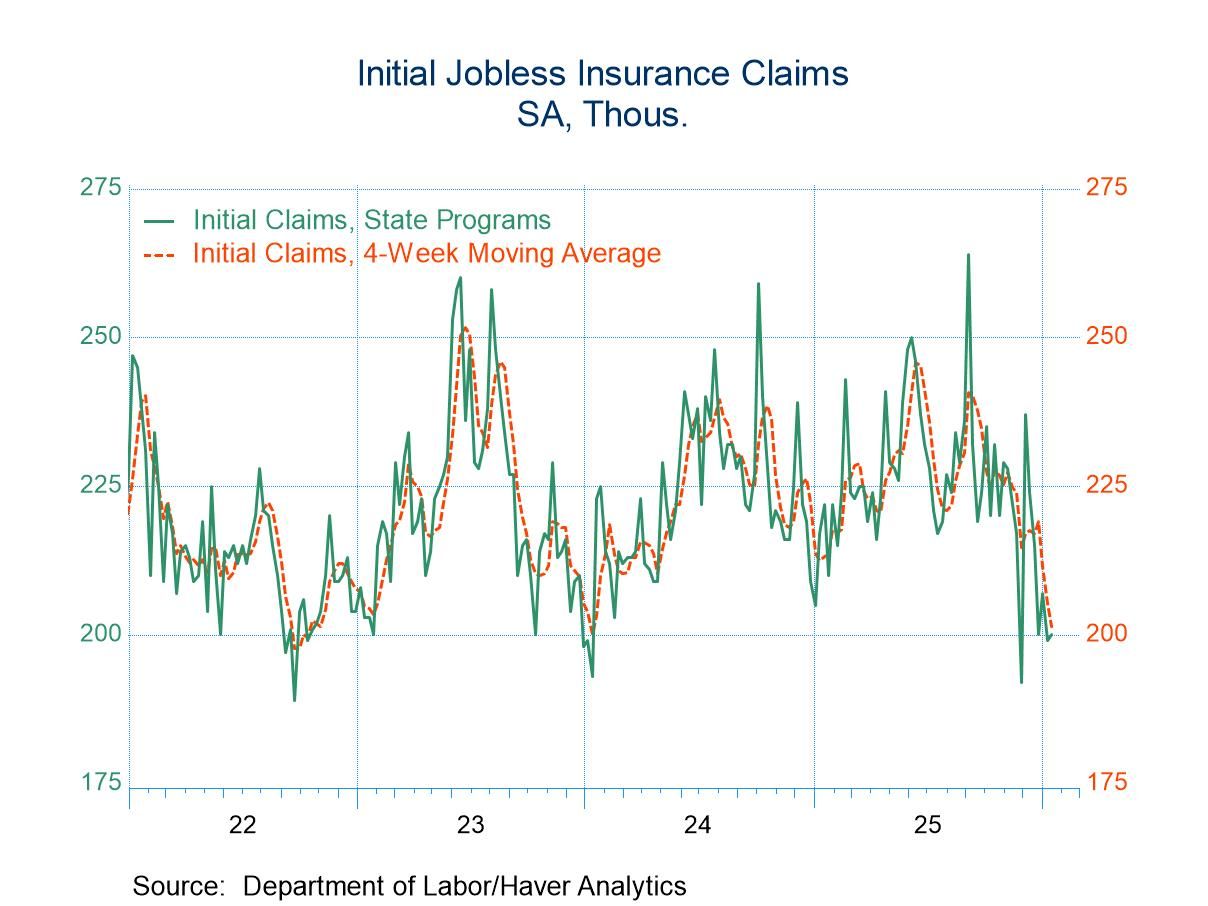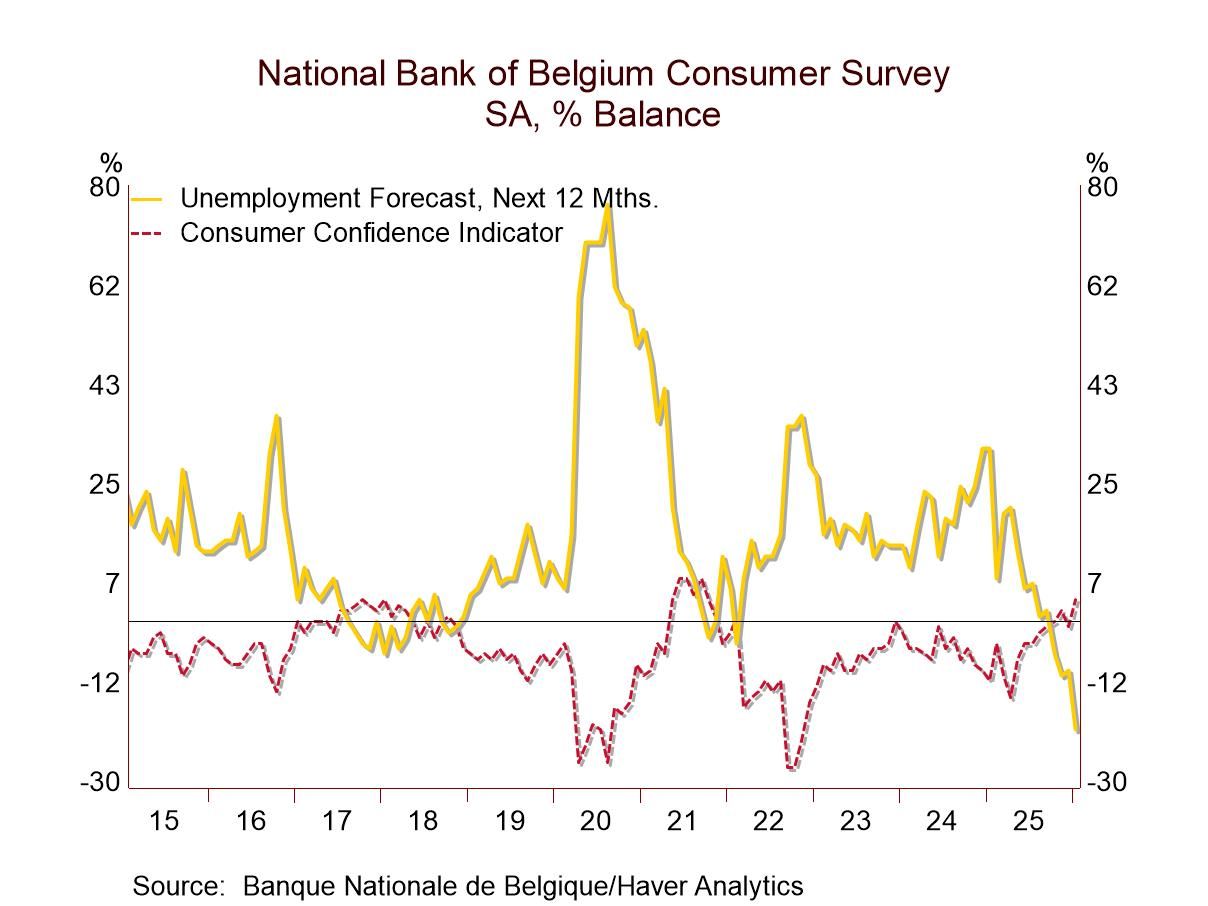 Global| Mar 17 2004
Global| Mar 17 2004Consumer Prices Rose Broadly
by:Tom Moeller
|in:Economy in Brief
Summary
The Consumer Price Index (CPI-U) rose 0.3% in February, matching Consensus expectations for a 0.3% gain. A 0.2% rise in prices less food & energy was slightly firmer than the 0.1% Consensus expectation. Prices of core consumer goods [...]
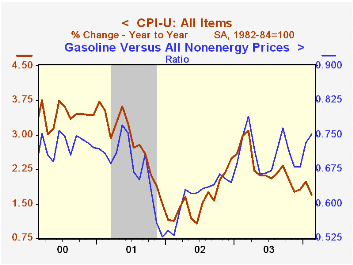
The Consumer Price Index (CPI-U) rose 0.3% in February, matching Consensus expectations for a 0.3% gain. A 0.2% rise in prices less food & energy was slightly firmer than the 0.1% Consensus expectation.
Prices of core consumer goods rose 0.2%, the firmest one month gain since August 2002. This strength reflected a 0.4% (2.4% y/y) rise in medical care commodities, a 0.4% (4.7% y/y) rise in educational books & supplies and a 0.4% (-0.7% y/y) gain in new vehicle prices. Prices for home furnishings & operation, up 0.2% (-1.6% y/y), also rose for the second consecutive month.
Apparel prices fell another 0.1% (-1.6% y/y) and tobacco prices also were off slightly (-0.0% y/y).
Core services prices rose a modest 0.1% as shelter prices ticked up just 0.1% (2.1% y/y). Prices for medical care services jumped 0.7% (4.7% y/y) but public transportation prices eased slightly (+2.2% y/y).
Energy prices moderated to a 1.7% gain following the 4.7% January spike. Gasoline prices rose 2.5% after the 8.1% jump in January (+2.0% y/y) but are up another 4.7% so far in March. Fuel oil prices rose 1.0% (-0.7% y/y) and piped gas prices rose 0.9% (6.2% y/y).
Food prices rose 0.2% and mostly reflected higher prices for fruits & vegetables, up 1.0% (2.9% y/y).
The chained CPI which adjusts for shifts in consumer buying behavior surged 0.6%. It is similar to the PCE price deflator. The core chain price measure also surged by 0.5%, the strongest gain since February 2002.
"Classical Deflation Theory" from the Federal Reserve Bank of Richmond can be found here.
| Consumer Price Index | Feb | Jan | Y/Y | 2003 | 2002 | 2001 |
|---|---|---|---|---|---|---|
| Total | 0.3% | 0.5% | 1.7% | 2.3% | 1.6% | 2.8% |
| Total less Food & Energy | 0.2% | 0.2% | 1.2% | 1.5% | 2.3% | 2.7% |
| Goods less Food & Energy | 0.2% | 0.0% | -2.0% | -2.0% | -1.1% | 0.3% |
| Services less Energy | 0.1% | 0.2% | 2.5% | 2.9% | 3.8% | 3.7% |
| Energy | 1.7% | 4.7% | 3.9% | 12.2% | -5.8% | 3.7% |
| Food | 0.2% | 0.0% | 3.2% | 2.1% | 1.8% | 3.1% |
| Chained CPI: Total (NSA) | 0.6% | 0.5% | 1.4% | 1.9% | 1.3% | 2.3% |
| Total less Food & Energy | 0.5% | 0.2% | 0.8% | 1.1% | 1.9% | 2.0% |
by Tom Moeller March 17, 2004
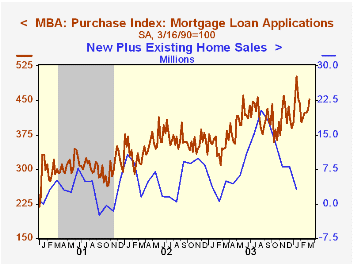
The index of mortgage applications compiled by the Mortgage Bankers Association jumped 25.6% last week for the fifth consecutive weekly gain.
Applications to refinance surged 39.7% (-46.9% y/y) as interest rates remained low.
The effective interest rate on a conventional 30-Year mortgage rose to 5.62% from 5.61% the week prior, but these rates are the lowest since last June. The effective rate on a 15-year mortgage ticked up to 5.01%.
Purchase applications rose 5.6% w/w (+30.3% y/y) and so far in March are 6.0% ahead of the February average.
During the last ten years there has been a 56% correlation between the y/y change in purchase applications and the change in new plus existing home sales.
The Mortgage Bankers Association surveys between 20 to 35 of the top lenders in the U.S. housing industry to derive its refinance, purchase and market indexes. The weekly survey accounts for more than 40% of all applications processed each week by mortgage lenders. Visit the Mortgage Bankers Association site here.
| MBA Mortgage Applications (3/16/90=100) | 03/12/04 | 03/05/04 | 2003 | 2002 | 2001 |
|---|---|---|---|---|---|
| Total Market Index | 1,117.1 | 889.1 | 1,067.9 | 799.7 | 625.6 |
| Purchase | 452.4 | 428.6 | 395.1 | 354.7 | 304.9 |
| Refinancing | 4,983.7 | 3,567.6 | 4,981.8 | 3,388.0 | 2,491.0 |
Tom Moeller
AuthorMore in Author Profile »Prior to joining Haver Analytics in 2000, Mr. Moeller worked as the Economist at Chancellor Capital Management from 1985 to 1999. There, he developed comprehensive economic forecasts and interpreted economic data for equity and fixed income portfolio managers. Also at Chancellor, Mr. Moeller worked as an equity analyst and was responsible for researching and rating companies in the economically sensitive automobile and housing industries for investment in Chancellor’s equity portfolio. Prior to joining Chancellor, Mr. Moeller was an Economist at Citibank from 1979 to 1984. He also analyzed pricing behavior in the metals industry for the Council on Wage and Price Stability in Washington, D.C. In 1999, Mr. Moeller received the award for most accurate forecast from the Forecasters' Club of New York. From 1990 to 1992 he was President of the New York Association for Business Economists. Mr. Moeller earned an M.B.A. in Finance from Fordham University, where he graduated in 1987. He holds a Bachelor of Arts in Economics from George Washington University.



